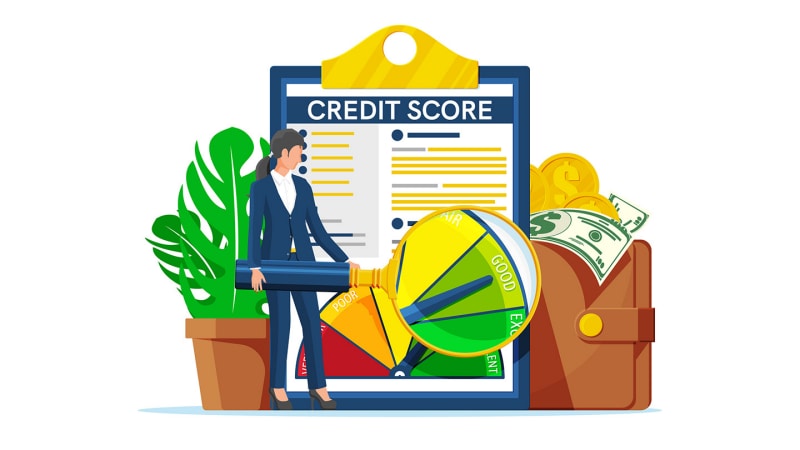720 credit score: A guide to credit scores

Highlights
- A 720 credit score is considered “good.”
- With a 720 credit score, you could have access to more opportunities.
- There are ways to help improve your score to hit the “excellent” credit score range.
When you check your score and see that it is 720, which is labeled as a good credit score, you might be wondering—what does that mean for you and your financial opportunities? In this article, we explore what a 720 credit score could mean for you.
Understanding your 720 credit score
A 720 credit score falls into the good credit score category for both VantageScore® and FICO® score. For VantageScore, a credit score of 661 or above is typically considered good whereas for FICO, anything at 670 or above is within the good range. This means you may have access to more financial opportunities than with a lower score, such as better annual percentage rates (APRs), which we will go into more detail later.
Calculating your credit score
Your credit score is calculated by several factors, including:
- Payment history: This is heavily considered for VantageScore and is the most significant factor in determining a FICO score. Payment history looks at your track record of making payments on time, including any late payments, delinquencies or accounts in collections.
- Credit utilization ratio: This is the percentage of your available credit that you are currently using.
- Length of credit history: This factor considers the length of time you have had credit accounts open. It looks at the age of your oldest account, the average age of all your accounts, and the time since you last used certain accounts.
- Credit mix: This includes the types of credit accounts you have, such as credit cards, mortgages, auto loans, and student loans. Having a diverse mix of credit accounts can be beneficial for your credit score.
- New credit: This factor looks at your recent credit activity, including the number of new accounts you have opened and the number of recent credit inquiries. Opening multiple new accounts within a short period or having too many credit inquiries can negatively impact your score.
Having a good score usually creates more opportunities
A 720 credit score falls in the higher tier of credit score ranges. With a 720 score, you’re in between the excellent credit range (which is typically 750 and above) and the “fair credit” range (about 580 to 669). You may have access to more beneficial opportunities, including but not limited to:
- Potential access to better interest rates and loan terms.
- Better chances of getting approved for loans and more premium credit cards.
- A higher likelihood of getting approved to rent an apartment or home, as landlords may run a credit check as part of your application process.
- Potential access to better insurance premiums, as many companies use your credit score to help determine rates.
- A good indication that you can be a reliable employee for future employers, as employee background credit checks may be part of your job application process.
Getting a loan with a 720 credit score
With a 720 credit score, you may have a higher chance of getting approved for a loan compared to those with lower credit scores. However, you will want to check if you qualify for what you’re applying for since some lenders may have different types of criteria for their consumers.
You may also want to compare your options to explore all the different opportunities you can have and pick the one that best suits you.
At the same time, while a 720 credit score is generally sufficient to qualify for many loans, a 750 credit score may provide an even higher likelihood of loan approval. Lenders may view individuals with a 750 credit score as lower risk borrowers and may be more willing to extend credit.
Buying a car with a 720 credit score
If you’re considering taking out an auto loan to help you buy a car, a 720 credit score could work in your favor. Not only will you be likely to be approved for an auto loan, but you may also have lower APRs than someone who has a lower credit score. According to Experian™'s State of the Automotive Finance Market reportOpens overlay, during the beginning of 2023, individuals with high credit scores had interest rates of around 5% for new car loans. On the other hand, for those with low credit scores (about 579 and lower) had an average APR of 14.08% for new car loans.
Ways to help increase a 720 credit score
If you’re looking to take your credit score to the next tier, you may be wondering how you can move your 720 credit score to a 750 credit score or higher, which is considered to be an “excellent” credit score. Being in this category of credit scores can help you get access to more credit cards of your liking and lower insurance premiums and APRs for future loans.
To help increase your 720 credit score to an even higher level, consider taking the following steps:
- Further lower your credit utilization ratio. Ideally this ratio should be around 30% or less.
- Build up a more robust credit mix. If you have limited types of accounts, you may want to consider taking out a personal loan or a new credit card to showcase your ability to manage multiple types of credit.
- Keep old credit card accounts open. If you’re thinking of closing a credit card because you don’t think you use it often enough, consider not doing it. Using it sparingly can keep the card active while maintaining the length of your credit history. Once you close the account, you might suffer a drop in your credit score.
- Consider using the credit score improvement feature within Credit Journey® to receive a personalized action plan provided by Experian to help increase your credit score.
Maintaining a good credit score
Whether your credit score falls in the good or excellent category, you have likely developed several habits that have helped you achieve this level of credit score and helped with maintaining healthy credit. These habits include, but are not limited to:
- Managing your budget and expenses.
- Regularly making efforts to pay off your debts.
- Keeping a good debt-to-income ratio.
- Keeping your credit usage low.
- Monitoring your credit score and credit report.
- Safeguarding sensitive information such as your Social Security number (SSN) and credit card account numbers. Using an identity monitoring service like the one offered for free through Chase Credit Journey can help safeguard your information.
In conclusion
With a 720 credit score, you can feel confident that you’ve showcased a quality level of creditworthiness. You likely have access to more financial opportunities than those with a lower credit score—but there's still room to improve. Continue to perform the healthy financial habits that have brought you this far while looking for additional opportunities to build more credit history, lower your credit utilization ratio and further diversify your credit mix. Doing so not only helps your chances of achieving an excellent credit score, but also may add to your overall financial wellness.



